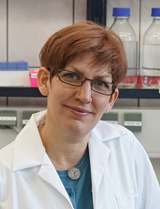Research Sketch:
Intestinal epithelial cells sense the presence of enteropathogenic microorganisms, forward this information to neighboring cells and underlying immune cells and provide efficient antimicrobial protection. Also under homeostatic conditions, the epithelium contributes actively to the maintenance of the mucosal barrier and repair following transient mucosal damage. Own results illustrate epithelial stimulation during microbial infection and identify regulatory mechanisms that help to maintain host-microbial homeostasis under physiological conditions. The most striking example of the dynamic function of the gut epithelium is the transition from the sterile and protected situation before birth to the mucosal surface of the adult intestine that is permanently exposed to the enteric microbiota and nutritional stimuli. Own results have identified both adaptive and developmentally regulated mechanisms that help to maintain host-microbial homeostasis and facilitate the establishment of a stable and highly diverse enteric microbiota. They illustrate the active role of the intestinal epithelium during the establishment and maintenance of mucosal immune homeostasis as well as antimicrobial host defense.
Selected Publications:
Dupont, A., Litvak, Y., Zhang, K., Sommer, F., Basic, M., Kühnel, M., Bäckhed, F., Fulde, M., Rosenshine, I., Hornef, M.W. Infection with enteropathogenic Escherichia coli (EPEC) is restricted to the perinatal period in mice. PLoS Pathog. 12(5):e1005616, 2016.
Torow, N., Yu, K., Hassani, K., Bleich, A., Lochner, M., Brenneke, A., Weiss, S., Förster, R., Pabst, O., Hornef, M.W. Active suppression of intestinal CD4+TCRαβ+ T lymphocyte maturation during the postnatal period. Nat Commun. 6: 7725, 2015.
Torow, N., Hornef, M.W. The neonatal ‘window of opportunity’, - setting the stage for the life-long host microbial interaction and immune homeostasis. J. Immunol. 198(2):557-563, 2017
van Best, N., Hornef, M.W., Savelkoul, P.H., Penders, J. On the origin of species: Factors shaping the establishment of infant's gut microbiota. Birth Defects Res C Embryo Today. 105(4):240-51, 2015
Chassin, C., Kocur, M., Pott, J., Duerr, C.U., Gütle, D., Lotz, M., Hornef, M.W. miR-146a mediates protective innate immune tolerance in the neonate intestine. Cell Host Microbe 8: 358-68, 2010



































